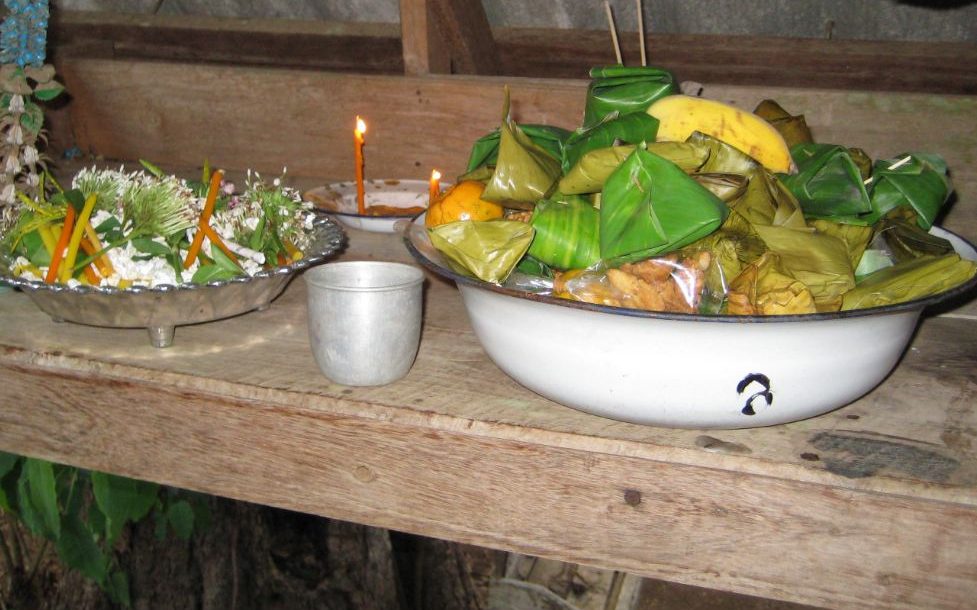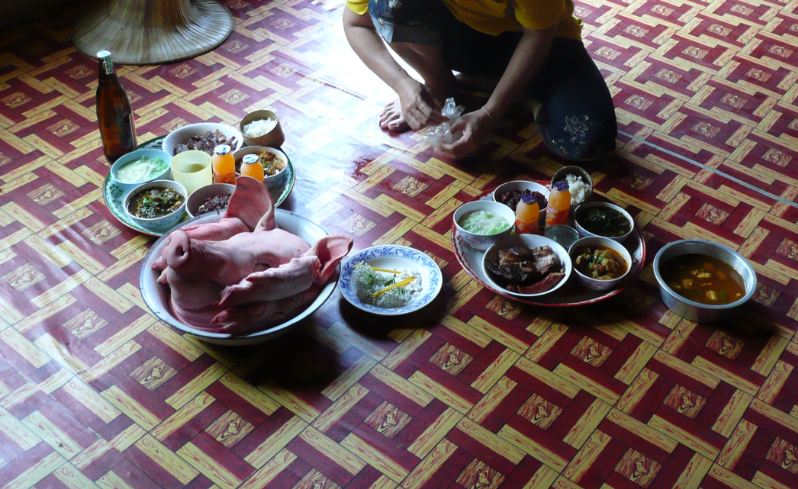This is the fourth in a series of posts providing extracts from my new book, Thailand’s Political Peasants. In Chapter 3 of the book I begin a detailed exploration of rural political society by focussing on the spirit world. Interactions with supernatural powers provide valuable insights into the way in which rural Thailand’s political society “is energized by a fundamental desire to be productively connected to sources of power.”
On the morning of Monday, 14 April 2008, Aunt Kluay prepared an elaborate feast. It was the second day of the new-year celebration and Kluay wanted to honor the spirits that had overseen her newfound prosperity. Early in the morning she made the short journey to the district market and spent a thousand baht buying two pig’s heads, the accompanying sets of trotters, and some choice portions of intestine and flesh. Back at her mother’s house, which lay just next to her own, Kluay carefully arranged the heads and trotters in large metal bowls. Working with her daughter and niece, she prepared fifteen bowls of curry, blood-soaked larb, and fried pork. The bowls were divided onto three platters. On each of these she added a small container of sticky rice, a bowl of vegetable soup, a bowl of sweet coconut jelly, two small bottles of orange juice, and a cup of water. Shortly before ten o’clock in the morning, Kluay and her daughter carried one of the pig’s heads and two of the platters upstairs to the main bedroom of her mother’s house. They were joined there by Grandmother Thip and Grandmother Duang, maternal relatives of Kluay’s deceased father. Grandmother Thip was the custodian of the protective spirit that resided on a small wooden shelf located in the northeast corner of the bedroom. Sitting before the shelf, Thip raised one of the platters of food above her head and, with a few words of offering, presented it to the spirit. Kluay then placed the platter on the spirit’s wooden shelf. The second platter, along with the pig’s head, was left on the floor. This platter of food was offered to another protective spirit that normally resided in a small wooden shrine just outside the house. This spirit was invited inside to join the feast and share in the honor of the pig’s head. The three women said some brief prayers and urged the spirits to eat.
Kluay then turned her attention to a much more public demonstration of her relationship with the spirit world. Just outside her family compound, many of the men of the village had assembled to present the new-year offering to the village’s guardian spirit, the Lord of the Lucky Tree. Giant woks of pork curry were bubbling away over outdoor fires. A small group of women carefully folded large leaves to make rustic platters on which the food would be presented to the lord and his assistants. Inside the lord’s shrine, which had been swept and washed for the occasion, a member of the village committee was collecting donations to help defray the costs. Suddenly, Kluay and her husband marched into the midst of the preparations, bearing the second pig’s head, a bottle of whisky, and the third platter of food. Their presence was all the more notable because both were wearing bright yellow shirts, the auspicious color of both Monday and Thailand’s king. They climbed the steps of the shrine and knelt before the long wooden shelf where the lord resides. The lord’s custodian then held the pig’s head and whisky above his head and presented them to the guardian spirit. He placed these offerings, along with the platter of food, on the wooden shelf. Kluay and her husband then returned to their home, while preparations for the village’s communal offering continued.
…
The spirit world is a useful place to commence a detailed exploration of Ban Tiam’s political society. Attitudes toward spirits reflect quite fundamental orientations toward power. These orientations are not fundamental in the sense that they derive from some unchanging cultural foundation. On the contrary … there is a significant degree of pragmatism and adaptability in dealings with the spirit world. Rather, orientations toward the supernatural power of spirits are fundamental because they relate to very basic concerns about safety, morality, health, and prosperity. Exploring the ritual relationships between the social and supernatural domains provides useful insights into the way in which dispersed and malleable nodes of power are drawn into the day-to-day worlds of livelihood, aspiration, and ambition. Aunt Kluay was an excellent networker, and she was determined to create an appropriate place for her spiritual guardians in the increasingly prosperous network of connections that she was building around her.
 Facebook
Facebook  Twitter
Twitter  Soundcloud
Soundcloud  Youtube
Youtube  Rss
Rss 
